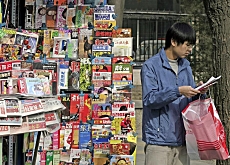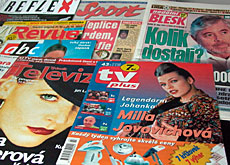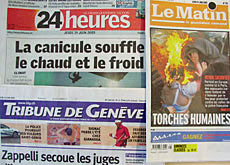Swiss publishers spread the word abroad

Swiss newspapers and magazines may not enjoy worldwide fame, but the printed word is rapidly becoming a very successful export venture.
But, as befits a multi-lingual federalist nation, the main publishing houses have noticeably different ways of conquering foreign markets.
Edipresse, which largely dominates French-speaking Switzerland, has just announced its first publishing venture in Asia – a majority stake in Hong Kong-based Communication Management Ltd.
The virtual takeover of the Asian number one for social, lifestyle, fashion and business magazines means Edipresse will now be competing with main domestic rival Ringier for the attention of trend-conscious Asians.
Ringier has already been active in the Chinese market for several years, after initially expanding into Eastern Europe in the early 1990s, and publishes a dozen specialist titles plus four mass-market magazines.
Lausanne-based Edipresse is no newcomer to foreign markets – all but 18 of its 132 titles are based abroad – but it has hesitated in the past to enter the massive Asian market.
Its existing foreign titles are primarily in Spain and Portugal, and it also has a growing presence in Greece, Poland, Romania, Ukraine, Russia and Mexico.
Asian promise
Chief financial officer Christopher Bolton says that the best opportunities for expansion were abroad. “We have a very strong magazine and newspaper base in Switzerland, but most of the growth potential is clearly elsewhere,” he told swissinfo.
“In particular, we have been looking seriously for the past 18 months at a possible move into Asia, and we see tremendous opportunity there.
“As far as magazine publishing is concerned, these are still very underdeveloped markets. In most of them, the big international brands are already present, but there are relatively few local titles.”
He adds that, while there are “obvious” differences between eastern European and Asian markets, there are also many similarities – particularly in terms of purchasing power, legal and administrative structures and distribution networks.
Another similarity is the nature of emerging market development – there is a clear progression over the years from demand for “basic” products (i.e. women’s or parent-child magazines) to more “sophisticated” publications (cars, interior design etc).
And Bolton believes that being a Swiss company definitely helps. “When we go into foreign markets, we have a lot of respect for the local culture, people, languages, etc.,” he said.
“Some of our competitors tend to take the approach: we’ve bought you, now we own you, so do as we say.”
Political minefields
One key difference between the Ringier and Edipresse approach to foreign expansion is the choice of vehicle.
The Zurich-based company has not hesitated to try its hand at local newspaper publishing – and take the risk of political fall-out.
Last year, more than 30 Romanian journalists quit their jobs at an influential daily newspaper, accusing the publisher of censoring criticism of the government.
Ringier denied editorial interference, and Swiss press council president Peter Studer said he was also surprised by the allegations.
Whatever the truth of the matter, Edipresse – like another Swiss rival abroad, Marquard Media – prefers to steer clear of such political minefields and focus on the glossy magazine market.
Red tape
Bolton says there are enough problems lurking even in the magazine sector.
“The main obstacles are mostly legal and administrative. Normally these types of markets are not very mature, there is still a lot of red tape and you need a degree of patience if you want to succeed.”
A second problem is that it can be difficult to find trained staff in emerging markets. The Edipresse approach is to start off with a relatively small operation, then train people in-house before trying to expand.
Last but not least, distribution networks are often not quite what western European publishers might be used to.
Home run
A foreign venture may also provide a base to return home in triumph.
Ringier, which has been highly successful in the former Yugoslav republic of Serbia, announced recently that it would bring its Serbian daily newspaper “Blic” to Europe.
“Blic Europa” has been developed as an independent edition aimed at the more than 950,000 Serbian nationals now living abroad.
The new paper – printed in Frankfurt – is now being sold in a number of countries, including Germany, Austria and Switzerland.
swissinfo, Chris Lewis
The Swiss publishing scene is dominated by a few companies, in particular Ringier, Tamedia and Edipresse.
Ringier and Edipresse are the two main global players.
The Zurich company has more than 40 titles in nine countries, ranging from eastern Europe to China, Indonesia and Vietnam.
Edipresse has 132 publications in nine countries.

In compliance with the JTI standards
More: SWI swissinfo.ch certified by the Journalism Trust Initiative


You can find an overview of ongoing debates with our journalists here. Please join us!
If you want to start a conversation about a topic raised in this article or want to report factual errors, email us at english@swissinfo.ch.